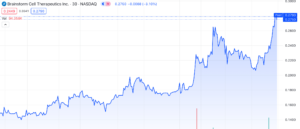BioPharma
Regen BioPharma Inc (OTCMKTS: RGBP) Major Runner as Biotech Secures Valuable NR2F6 Cancer T-Cell Activation Patent
Published
3 years agoon
By
Boe Rimes
Regen BioPharma Inc (OTCMKTS: RGBP) is making a powerful move up the charts looking to break out of its trading range and make a run on its recent highs of $0.081 in April which came after Regen and its subsidiary KLS entered into an agreement with Oncology Pharma, Inc. whereby Regen granted to Licensee an exclusive right and license for the development and commercialization of certain intellectual property for the treatment in humans of pancreatic cancer for a term of fifteen years. The License IP consists of antigen specific cancer vaccines in which modified mRNA is administered to produce epitopes able to produce an immune response which augments likelihood of successful induction of immunity. An epitope is the part of an antigen that is recognized by the immune system. The Company is currently in the process of updating its filings and preparing outstanding 10Q and 10k reports in order to up list to fully reporting otcqb “pink current” tier.
RGBP is once again on the move after the Company reported it was informed by the United States Patent and Trademark Office ( USPTO) that patent protection shall be granted to KCL with regard to “METHODS AND MEANS OF GENERATING IL-17 ASSOCIATED ANTITUMOR EFFECTOR CELLS BY INHIBITION OF NR2F6 INHIBITION \The Invention pertains to stimulation of immunity to cancer antigens through augmentation of NR2F6 inhibition to augment T-cell activation. The NR2F6 nuclear receptor has been identified as a potentially very important immune cell inhibitor (an immune checkpoint) and cancer stem cell differentiator. Investors are looking for a break over $0.082 – RGBP buyout rumors abound; according to many investors It appears there may be a Potential Merger Acquisition looming with Precigen OR another Big Pharma and if so it would make perfect sense for the following reasons. The CEO of Precigen (PGEN) Helen Sabzevari is on RGBP’s Scientific Advisory Board. PGEN trades on Nasdaq with a Market Cap of $1.3B and has an extensive clinical trials pipeline in Immunology-Oncology that includes development of mRNA vaccines therapies. https://precigen.com/about. Regenis in the same clinical therapeutic niche market of Oncology-Immunology candidate drug development that RGBP is in. 100% identical including the same mRNA vaccine technology so logically speaking it would make sense if PGEN straight up buys-out RGBP OR does a Merger Acquisition and IMO the motive to do this are the numerous valuable Patents RGBP owns that have Billion Dollar Market Capacity. Koos is presently on an aggressive campaign to pull everything together about RGBP in the shortest amount of time to apparently ready the company for SALE! If you look closely at his recent actions it points to this.
 Regen BioPharma Inc (OTCMKTS: RGBP) is a publicly traded biotechnology company focused on the immunology and immunotherapy space. The Company plans to rapidly advance novel technologies through pre-clinical and Phase I/ II clinical trials. Currently, the Company is advancing small molecule therapies for treating cancer and autoimmune disorders by modulating the Checkpoint NR2F6. The company also developing products treating blood disorders using small molecules and gene silencing (DiffronC), treating cancer with cellular immunotherapy (dCellVax), modulating key molecular processes in cancer stem cell through its patented molecular targeting approaches (BORIS), and repairing damaged bone marrow in patients with aplastic anemia and chemotherapy/radiotherapy treated cancer patients (HemaXellerate). RGBP owns a valuable patent porfolio.
Regen BioPharma Inc (OTCMKTS: RGBP) is a publicly traded biotechnology company focused on the immunology and immunotherapy space. The Company plans to rapidly advance novel technologies through pre-clinical and Phase I/ II clinical trials. Currently, the Company is advancing small molecule therapies for treating cancer and autoimmune disorders by modulating the Checkpoint NR2F6. The company also developing products treating blood disorders using small molecules and gene silencing (DiffronC), treating cancer with cellular immunotherapy (dCellVax), modulating key molecular processes in cancer stem cell through its patented molecular targeting approaches (BORIS), and repairing damaged bone marrow in patients with aplastic anemia and chemotherapy/radiotherapy treated cancer patients (HemaXellerate). RGBP owns a valuable patent porfolio.
 The Company is led by CEO David Koos who has over 30 years of investment banking and venture capital experience. He has a deep knowledge of startup businesses, public markers and SEC reporting companies. Dr. Koos has extensive relationships with large and small financial institutions, hedge funds and entities that Regen BioPharma expects to leverage for company growth. Dr. Koos has a Ph.D. in Sociology and a Doctor of Business Administration with an emphasis in finance. Additionally, he has authored / co–authored numerous peer reviewed journal articles. Dr. Koos has been working hard behind the scenes getting all the filings into OTC Markets Group in order to go “pink current”
The Company is led by CEO David Koos who has over 30 years of investment banking and venture capital experience. He has a deep knowledge of startup businesses, public markers and SEC reporting companies. Dr. Koos has extensive relationships with large and small financial institutions, hedge funds and entities that Regen BioPharma expects to leverage for company growth. Dr. Koos has a Ph.D. in Sociology and a Doctor of Business Administration with an emphasis in finance. Additionally, he has authored / co–authored numerous peer reviewed journal articles. Dr. Koos has been working hard behind the scenes getting all the filings into OTC Markets Group in order to go “pink current”
Regen has identified and filed patents on small molecules that activate and inhibit a novel gene (NR2F6) which controls how the immune system reacts to cancer cells and to inflammatory responses. The Company’s products include HemaXellerate, a personalized cellular therapeutic product designed to stimulate blood production in patients whose bone marrow is not properly functioning. HemaXellerate uses patient’s own fat as source of endothelial cells to heal damaged bone marrow Aplastic Anemia Stem Cell Therapy – HemaXellerate – IND #15376 CLEARED TO PROCEED TO PHASE I / II CLINICAL TRIALS. The United States Food and Drug Administration Investigational New Drug Application cleared (IND #15376)
dCellVax Breast Cancer – dCellVax – IND #16200. CellVax is a dendritic cell based immunotherapy that stimulates the patient’s immune system through a process called “gene silencing.” Establishment of safety will allow for rapid expansion of patient numbers. Currently addressing FDA questions with Dr. Santosh Kesari, head of UCSD Neuro-Oncology program.
DiffronC – Myelodysplastic Syndrome Gene Silencing – DiffronC is a novel form of therapy called differentiation therapy that is expected to have much milder toxicity than chemotherapy. The mechanism of action is to correct the specific genes that prevent the myelodysplastic syndrome stem cell from producing mature blood cells. Silencing using DiffronC induces differentiation of cancer cells. Initial indication is treatment of myelodysplastic syndrome. Other indications include solid tumors and acute leukemia.
Telomeres & Genomic Integrity: Stem cells and cancer cells have found ways of maintaining their telomeres in a state that prevents senescence. Our research in to the cancer stem cell has given us a molecular pathway that can be manipulated to expand stem cells and maintain telomeres. Telomeres are protective structures at the ends of chromosomes that enable cell divisions. Telomere attrition is involved in aging, cancer and genetic mutations. The Company is developing drugs that modulate telomere maintenance. In pre-clinical development for indications of solid cancers and acute leukemia.
In the CBD space RGBP researchers have determined that combining its lead NR2F6 small molecule agonist with Cannabidiol (CBD) may provide a dynamic therapy for treating inflammatory bowel disease (IBD). Currently, there are a number of pre-clinical and clinical studies being conducted by other companies regarding pain management that suggest potential benefits of CBD. Regen believes that CBD may augment the Company’s small molecule therapies for autoimmune disorders, in this case specifically IBD. IBD is a disease caused by persistent and chronic inflammation of the gastrointestinal tract and is a term that refers to both ulcerative colitis and Crohn’s disease. Current treatments include non-specific immune suppressors such as steroids as well as newer drugs recently approved by the FDA. The IBD market size is estimated at $6.7 billion global and projected to be $7.6 billion by 2023.There are currently no non-steroidal therapies available to IBD sufferers.
Let’s objectively review what that is:
1). on 4/8/21 he files an 8K which in and of itself is a dead give-a-away of what he’s up to. The question begs why would he file an 8K that specifically gives himself exclusive control of voting rights in negotiations for the sale of the company during the bidding process that’s specifically intended to prevent a Hostile Take Over? And in doing this he states quote: “persons of interest who want to ACQUIRE RGBP must negotiate directly.” This is in reference to himself having sole control of voting rights that this 8K gives him. Other words, negotiations for sale of the company can’t go around him to his board which is a typical move in any hostile take over. This by itself reveals what he’s up to in addition to MANY other factors shown below. https://sec.report/Document/0001607062-21-000145/
2). he recently hired a Firm to get OTC current with FULL disclosure reporting. This has to do not only with SEC compliance to remain listed on the OTC beyond September 2021 but ALSO it provides transparency for any potential Big Pharma buyers that would never consider buying a company otherwise.
3). on 6/1/21 he files another 8K that has to do with resolving a lawsuit. This would be important to any potential buyers for reason a pending unresolved lawsuit would likely complicate negotiations of a buy out, or it would be a deterrent altogether. https://sec.report/Document/0001607062-21-000145/
4). we see him moving to get all his expired Patents updated. Logically this move would be consistent with preparing for an acquiring company to take over the patents then turn around and file an FDA IND post buy out in order to immediately place those candidate drug Patents in their clinical trials pipeline.
5). lastly he’s not updating the company website that’s been outdated for years. Why would he invested time, energy, and money in updating his company website if he’s about to sell the company?
$RGBP PATENT APPROVED, wooohoooo load up before the week ends and smile big next week pic.twitter.com/UAH0YFvg5y
— Johe (@Johetrader) July 2, 2021
To Find out the inside Scoop on RGBP Subscribe to Microcapdaily.com Right Now by entering your Email in the box below
According to the 8k RGBP entered into an agreement with Oncology Pharma, Inc. whereby Regen granted to Licensee an exclusive right and license for the development and commercialization of certain intellectual property for the treatment in humans of pancreatic cancer for a term of fifteen years from April 7, 2021. The License IP consists of antigen specific cancer vaccines in which modified mRNA is administered to produce epitopes able to produce an immune response which augments likelihood of successful induction of immunity. An epitope is the part of an antigen that is recognized by the immune system.
As consideration to Regen for the rights and license granted pursuant to the Agreement Licensee shall: pay to Regen a nonrefundable fee of $55,000 no later than April 20,2021, pay to Regen royalties equal to five percent (5%) of the Net Sales as Net Sales are defined in the Agreement of any Licensed Products in a quarter. pay to Regen ten percent (10%) of all consideration (in the case of in-kind consideration, at fair market value as monetary consideration) received by Licensee from sublicensees, excluding royalties from sublicensees based on Net Sales of any Licensed Products for which Regen receives payment.
On April 7, 2021 KCL Therapeutics, Inc. (“KCL”) (RGBP subsidiary) entered into an agreement with Oncology Pharma, Inc. whereby KCL granted to Licensee an exclusive right and license for the development and commercialization of certain intellectual property for the treatment in humans of colon cancer for a term of fifteen years from April 7, 2021.
As consideration to KCL for the rights and license granted pursuant to the Agreement Licensee shall: pay to KCL a nonrefundable fee of Fifty Thousand common shares of Oncology Pharma, Inc. no later than April 20,2021, pay to KCL royalties equal to five percent (5%) of the Net Sales as Net Sales are defined in the Agreement of any Licensed Products in a quarter. pay to KCL ten percent (10%) of all consideration (in the case of in-kind consideration, at fair market value as monetary consideration) received by Licensee from sublicensees, excluding royalties from sublicensees based on Net Sales of any Licensed Products for which KCL receives payment. ONCP is trading at $33 at an $847 million market valuation, the 50,000 shares are worth $1,500,000)
in a form 8k from July 2 KCL Therapeutics, Inc., a wholly owned subsidiary Regen Biopharma Inc. was informed by the United States Patent and Trademark Office ( USPTO) that patent protection shall be granted to KCL with regard to “METHODS AND MEANS OF GENERATING IL-17 ASSOCIATED ANTITUMOR EFFECTOR CELLS BY INHIBITION OF NR2F6 INHIBITION \The Invention pertains to stimulation of immunity to cancer antigens through augmentation of NR2F6 inhibition to augment T-cell activation. The NR2F6 nuclear receptor has been identified as a potentially very important immune cell inhibitor (an immune checkpoint) and cancer stem cell differentiator.
https://twitter.com/BuggaTss/status/1411023473900617733
For more on RGBP Subscribe Right Now!
RGBP is making a powerful move up the charts looking to break out of its trading range and make a run on its recent highs of $0.081 in April which came after Regen and its subsidiary KLS entered into an agreement with Oncology Pharma, Inc. whereby Regen granted to Licensee an exclusive right and license for the development and commercialization of certain intellectual property for the treatment in humans of pancreatic cancer for a term of fifteen years. The License IP consists of antigen specific cancer vaccines in which modified mRNA is administered to produce epitopes able to produce an immune response which augments likelihood of successful induction of immunity. An epitope is the part of an antigen that is recognized by the immune system. The Company is currently in the process of updating its filings and preparing outstanding 10Q and 10k reports in order to up list to fully reporting otcqb “pink current” tier. RGBP is once again on the move after the Company reported it was informed by the United States Patent and Trademark Office ( USPTO) that patent protection shall be granted to KCL with regard to “METHODS AND MEANS OF GENERATING IL-17 ASSOCIATED ANTITUMOR EFFECTOR CELLS BY INHIBITION OF NR2F6 INHIBITION \The Invention pertains to stimulation of immunity to cancer antigens through augmentation of NR2F6 inhibition to augment T-cell activation. The NR2F6 nuclear receptor has been identified as a potentially very important immune cell inhibitor (an immune checkpoint) and cancer stem cell differentiator. Investors are looking for a break over $0.082 – RGBP buyout rumors abound; according to many investors It appears there may be a Potential Merger Acquisition looming with Precigen OR another Big Pharma and if so it would make perfect sense for the following reasons. The CEO of Precigen (PGEN) Helen Sabzevari is on RGBP’s Scientific Advisory Board. PGEN trades on Nasdaq with a Market Cap of $1.3B and has an extensive clinical trials pipeline in Immunology-Oncology that includes development of mRNA vaccines therapies. https://precigen.com/about. Regenis in the same clinical therapeutic niche market of Oncology-Immunology candidate drug development that RGBP is in. 100% identical including the same mRNA vaccine technology so logically speaking it would make sense if PGEN straight up buys-out RGBP OR does a Merger Acquisition and IMO the motive to do this are the numerous valuable Patents RGBP owns that have Billion Dollar Market Capacity. Koos is presently on an aggressive campaign to pull everything together about RGBP in the shortest amount of time to apparently ready the company for SALE! If you look closely at his recent actions it points to this. We will be updating on RGBP when more details emerge so make sure you are subscribed to Microcapdaily so you know what’s going on with RGBP.
Subscribe to Our 100% Free Penny Stock Newsletter. We Have Something Big Coming!
Disclosure: we hold no position in RGBP either long or short and we have not been compensated for this article
You may like
-


Regen BioPharma Inc (OTCMKTS: RGBP) Breaking Out as Biotech Files Patent on Dendritic Cell Technologies to Augment Efficacy of Survivin mRNA Cancer Immunotherapeutic Vaccine
-


Regen BioPharma Inc (OTCMKTS: RGBP) Under Accumulation as Biotech Sleeper Makes Major Reversal Northbound (A look at Intellectual Property / mRNA Vaccine)
-


Regen BioPharma Inc (OTCMKTS: RGBP) Major Reversal Brewing as Biotech Looks to Commercialize its Modified mRNA anti-cancer Vaccine & Accelerate Clinical Development of its NR2F6 Therapies
-


Regen BioPharma Inc (OTCMKTS: RGBP) Northbound as Biotech Grows Valuable Patent Portfolio & Grants 2 Licenses to Oncology Pharma for $1.9 Million
-


Regen BioPharma Inc (OTCMKTS: RGBP) Heats Up as Biotech Up Lists & Signs LOI to Acquire Canary Oncoceutics, Inc
-


Regen BioPharma Inc (OTCMKTS: RGBP) Mega Runner as Biotech Moves Towards “Pink Current” & Cancer Vaccine Patent Approved
BioPharma
Brainstorm Cell Therapeutics’ (NASDAQ: BCLI) Post-Setback Resurgence: Unpacking FDA Impact & Market Expectations
Published
5 months agoon
November 30, 2023
Brainstorm Cell Therapeutics (NASDAQ: BCLI) continues to gain momentum with a surge of over 125% since its low on October 31st, 2023. Following an unfavourable FDA decision on its ALS treatment, the stock hit an all-time low of $0.13 per share. Nethertheless, the stock experienced a significant rebound today, November 30th, 2023, rising by 26%, without accompanying press releases or SEC filings.
This resurgence prompts us to evaluate the possibilities for yet another company struggling to meet NASDAQ’s minimum bid requirements. A closer examination of recent months reveals intriguing developments that might pique the interest of potential investors. Our findings suggest BCLI holds promising near term prospects that could significantly alter its course.
Background:
BCLI specializes in developing therapies that utilize a patient’s own stem cells to combat severe neurodegenerative ailments like Amyotrophic Lateral Sclerosis (ALS) and progressive Multiple Sclerosis (MS). ALS affects nerve cells in the brain and spinal cord, while MS affects the central nervous system, causing problems with vision, balance, and muscle control.
The company holds exclusive global rights for the clinical advancement and commercialization of the NurOwn® technology platform, enabling the production of autologous MSC-NTF cells. These cells have received significant recognition and were awarded Orphan Drug designation by both the FDA and the European Medicines Agency (EMA).
Autologous MSC-NTF cells:
The way Autologous MSC-NTF cells work is very interesting. They’re a specific cell type obtained from an individual’s mesenchymal stem cells (MSCs). These cells are then genetically altered to produce neurotrophic factors (NTFs), which are designed to support and stimulate the growth and survival of nerve cells within the nervous system.
BrainStorm has conducted a Phase 3 clinical trial (NCT03280056) investigating the safety and effectiveness of multiple doses of autologous MSC-NTF cells for ALS. This trial received support from the California Institute for Regenerative Medicine, the ALS Association, and I AM ALS. Additionally, the company completed a Phase 2 open-label multicenter trial (NCT03799718) for progressive MS using these cells, backed by a grant from the National MS Society (NMSS).
Back to Square One:
Unfortunately for BCLI, 17 FDA advisory panel members voted that the data presented for their Phase 3 clinical trial for ALS did not demonstrate substantial evidence of the effectiveness of NurOwn for the treatment of mild-to-moderate ALS. There was simply only one member who voted in favour and another member that abstained from voting entirely.
Predictably, this resulted in a substantial downturn in the company’s share price, causing BCLI to plummet 87% below NASDAQ’s minimum bid compliance threshold of $1.00.
Subscribe to Microcapdaily.com Right Now by entering your Email in the box below.
Subscribe to Our 100% Free Penny Stock Newsletter. We Have Something Big Coming!
Is it Over?:
To those not well-versed in this matter, it might appear as if BCLI is forced to throw in the towel and start everything from scratch, but the reality is actually quite different.
When a drug fails in clinical trials, the pharmaceutical company or researchers typically reassess the data to understand why the drug failed.
They might conduct further analysis to determine if there were unforeseen side effects, issues with the study design, or if the drug simply didn’t show the desired effectiveness. They’ll work to make adjustments, refine the drug’s formulation, or in some cases, explore other alternatives by re-designing new clinical trials to evaluate the drug’s safety & efficacy for a different condition.
If none of those efforts yield a positive outcome, it’s typical to halt further development of that specific drug.
Regardless of the FDA’s decision, Co-CEO Lindborg mentioned, “We firmly believe that the data for NurOwn presented today provide a compelling case for approval, with clinical evidence in those with less advanced disease supported by strong and consistent biomarker data that are predictive of clinical response,”
Unfortunately for Lindborg, the decision does not rest with her. A panelist from the FDA, Lisa Lee, expressed, “Providing false hope can be ethically problematic and false hope is provided when the probability of a positive outcome is overestimated. And I think that seems to be the case here.”
After the devastating press release on September 27th, 2023, most of the retail crowd was on board with the FDA, mentioning it was time for BCLI to pack up, and go home – especially after seeing these comments from the FDA.
What Happened:
Amid FDA skepticism and investor uncertainties, BCLI took decisive action, securing a chance for a new phase 3 trial to showcase the effectiveness and safety of their NurOwn® technology for ALS treatment.
On October 24th, 2023, BCLI issued a press release affirming their conviction in the compelling data and expressing their intent to further substantiate it to the FDA.
More specifically, this was a “Strategic realignment” designed to:
- Support the company plans to conduct a double-blind, placebo-controlled Phase 3b U.S. clinical trial for NurOwn in ALS with an open-label extension and
- Continue to publish data from NurOwn’s Phase 3 clinical trial on biomarkers, long-term safety, survival, and the Expanded Access Program, providing transparency around NurOwn data and progressing ALS drug development.
Big Release:
Then on November 20th, 2023, BCLI issued another press release, stating that the FDA granted them an in person meeting to discuss the regulatory path forward for NurOwn® in ALS.
Within’ the last month or so, it appears the market is HIGHLY anticipating the outcome of this meeting, given it is now scheduled to take place on December 6, 2023.
This meeting allows BCLI to have a Special Protocol Assessment (SPA) with the FDA to agree on the overall protocol design for a confirmatory Phase 3 trial in ALS.
If you aren’t familiar with a SPA, it’s an agreement between a pharmaceutical company and the FDA regarding the design, endpoints, and size of a clinical trial intended to support a New Drug Application (NDA) or Biologics License Application (BLA). This agreement aims to confirm that the trial design, data analysis, and endpoints are acceptable to the FDA for the regulatory approval process.
A favorable result from this meeting could greatly benefit BCLI, paving the way for the actual launch of NurOwn®. This outcome stands in stark contrast to the prior belief, post the September 27th, 2023 news, which led many to assume otherwise.
If the trend remains positive, BCLI could see a significant surge in valuation, given the substantially reduced risk associated with a drug nearing commercial availability.
Conclusion:
Boosting the optimism for December 6th is the heightened enthusiasm among retail investors surrounding the company. Some speculate that the surge might mirror what SNGX experienced today, on November 20th, 2023. With technical day traders and swing traders in the mix, many perceive this as the final opportunity to join the trend before it gains further momentum. It’s crucial to remain vigilant as December 6 approaches rapidly, potentially ushering BCLI into an entirely altered and positive scenario.
We will update you on BCLI when more details emerge, subscribe to Microcapdaily to follow along!
Subscribe to Our 100% Free Penny Stock Newsletter. We Have Something Big Coming!
Disclosure: We have not been compensated for this article/video. MicroCap Daily is not an investment advisor; this article/video does not provide investment advice. Always do your research, make your own investment decisions, or consult with your nearest financial advisor. This article/video is not a solicitation or recommendation to buy, sell, or hold securities. This article/video is our opinion, is meant for informational and educational purposes only, and does not provide investment advice. Past performance is not indicative of future performance.
Picture by ckstockphoto from Pixabay.com
BioPharma
Apollomics (NASDAQ: APLM) Market Momentum: Pipeline Potential, Market Trends, and Retail Insights
Published
5 months agoon
November 27, 2023
Apollomics, Inc. (NASDAQ: APLM) has seen a significant surge in its shares, rising by ~20% at time of writing, accumulating a staggering 58% gain since November 21st, 2023. Surprisingly, there haven’t been any noticeable press releases or filings to explain this sudden valuation shift, so it’s prompted a closer examination on our end. Fortunately enough, we found the force driving the substantial gain, but first let’s look into APLM’s background to build a better picture of the opportunity at hand.
 Background:
Background:
APLM’s emergence as a public company is relatively recent, stemming from its merger with Maxpro Capital Acquisition Corp. (Nasdaq: JMAC) on March 30th, 2023. This merger also involved a $23.65 million private investment in public equity (PIPE) financing, a typical move when companies go public, aiming to secure capital. With this recent funding, APLM anticipates financial support through mid-2024, empowering the company to push forward with its ambitious lineup of 9 drug candidates.
APLM stands as an innovative player in the field of clinical-stage biopharmaceuticals, specializing in crafting cancer therapies that work hand-in-hand with the immune system and target precise molecular pathways to combat cancer. With a focus on oncology, the company boasts a lineup of nine potential drug candidates, six of which are actively progressing through clinical development stages.
Among its flagship projects are vebreltinib (APL-101), a potent c-MET inhibitor that targets multiple forms of non-small cell lung cancer (NSCLC), and uproleselan (APL-106), an E-Selectin antagonist designed to potentially enhance standard chemotherapy in treating acute myeloid leukemia.
Latest Release:
APLM recently announced significant news concerning its Chinese partner, Avistone Biotechnology, on November 11th, 2023. Avistone received conditional approval from China’s National Medical Products Administration (NMPA) to market vebreltinib. This medication is intended for treating a particular type of lung cancer known as MET exon 14 skipping non-small cell lung cancer (NSCLC).
Dr. Guo-Liang Yu, Apollomics’ leader, praised Avistone for this achievement, saying it’s a big step toward finding better treatments for tough cancers. Vebreltinib is a powerful medicine that targets how cancer cells grow. It could be a breakthrough for people with this specific lung cancer and other cancers caused by similar changes in cells.
Apollomics is talking with the U.S. Food and Drug Administration (FDA) about using vebreltinib to treat this kind of lung cancer in the U.S. They’re using data from their global study and Avistone’s study in China to do this.
It’s no secret, Lung cancer is a big problem, especially for people with non-small cell lung cancer (NSCLC), which is responsible for most lung cancer cases. This specific mutation has a significant unmet need, and APLM’s vebreltinib could be hope for those battling the devastating disease.
Subscribe to Microcapdaily.com Right Now by entering your Email in the box below.
Subscribe to Our 100% Free Penny Stock Newsletter. We Have Something Big Coming!
Market Opportunity:
To keep things simple, we’ll continue focusing on APLM’s Vebreltinib (APL-101), which is just 1 of 9 drugs in their pipeline.
This specific drug, cultivated through a collaboration with Beijing Pearl Biotechnology (now merged with Avistone Biotechnology), appears to display considerable potential. Its appeal lies in its demonstrated safety, effectiveness, and its potential to address a specific market segment where there’s a significant demand for treatments due to unmet medical needs.
Vebreltinib (APL-101):
APL-101 is being evaluated for its potential use in combating specific types of Non-Small Cell Lung Cancer (NSCLC), and a particularly aggressive form of brain cancer, secondary glioblastoma multiforme (sGBM).
APL-101 is a Type 1b class highly selective c-MET inhibitor. More simply put, it’s a drug that effectively targets and blocks the c-MET protein.
c-MET inhibitors have a wide potential range of markets due to the involvement of the c-MET pathway in various cancers and other diseases. The c-MET receptor, also known as the hepatocyte growth factor receptor (HGFR), plays a crucial role in cell growth, survival, and migration. Dysregulation of the c-MET pathway is associated with tumor growth, metastasis, and resistance to certain therapies in multiple cancer types.
Outside of NSCLC and sGBM, Apollomics has already seen promising effects inhibiting tumors related to certain types of cancers like gastric, hepatic, and pancreatic. But to keep things simple, we’ll stick to Apollomics core focus in NSCLC and sGBM.
The Market:
According to statistics published by the World Health Organization (WHO) from February 2022, 2.2 million patients were diagnosed with lung cancer in 2020, and non-small cell lung cancer accounted for nearly 85% of all lung cancer patients.
The global non-small cell lung carcinoma (NSCLC) market is expected to garner a market value of US$ 8.25 Billion in 2023 and is expected to accumulate a market value of US$ 21.40 Billion by registering a CAGR of 10% in the forecast period 2023 to 2033.
Delving deeper into particular types of NSCLC, the market potential for Exon-14 skip mutated NSCLC, c-MET amplifications in NSCLC (denovo), and c-MET amplifications in NSCLC (resistance driven) collectively represents a 3 billion-dollar opportunity.
In contrast, the market size for the population affected by epidermal growth factor receptor (EGFR) mutated NSCLC stands at a larger 7 billion-dollar opportunity.
Subscribe to Microcapdaily.com Right Now by entering your Email in the box below.
Subscribe to Our 100% Free Penny Stock Newsletter. We Have Something Big Coming!
SPARTA Trial:
SPARTA is part of a larger study combining Phase 1 and Phase 2 trials, conducted in 13 countries, 90+ sites and 370+ patients worldwide. It aims to understand how safe and effective vebreltinib is in treating various cancers. More specifically, it’s looking at non-small cell lung cancer (NSCLC) with a specific genetic mutation called c-MET exon 14 skipping, as well as other cancers with c-MET amplification or fusions.
The trial involves different groups of patients: those new to treatments targeting the c-MET protein and those who have previously received such treatments for NSCLC with the mutation. Additionally, it includes patients with various solid tumors showing c-MET amplifications or fusions, including glioblastoma multiforme, a severe type of brain cancer.
The main goal of SPARTA is to measure how well vebreltinib works by assessing the overall response rate (ORR) and how long the response lasts (duration of response) using specific evaluation criteria for each type of tumor. Secondary goals involve looking at any side effects and additional measures like time to progression, progression-free survival, and overall survival.
Overall the clinical findings show that vebreltinib could be a promising new treatment for cancers caused by MET alterations, especially in Non-Small Cell Lung Cancer (NSCLC) with MetEx14 skipping mutation. In a phase 2 trial, there was 75% overall response rate in patients with advanced NSCLC.
If you’d like more formal clinical trial information for vebreltinib, it’s is available on clinicaltrials.gov under the Phase 1/2 SPARTA trial (NCT03175224).
Big Picture:
This is just 1 of 9 drugs in APLM’s pipeline, and APL-101 is just 1 of 2 key assets. With our initial examination of the company, we were taken aback by the comparatively low valuation despite the promising pipeline. Like many, there has been a considerable decline in share value since their public listing.
Now that China’s National Medical Products Administration (NMPA) has given conditional approval, the company intends to get Vebreltinib (APL-101) approved in the U.S. and has met with the FDA in July. With an existing approval by the NMPA, receiving the NDA Approval from the FDA should realistically be a much quicker process.
On top of this, more interesting developments have occurred from online sources, indicating substantial short activity, further hinting at the possibility of APLM being the next big short squeeze candidate.
What Happened & Retail Insights:
APLM seems to be gaining attention across various social media platforms, notibly Twitter and Reddit.
Numerous investors are discussing on different platforms that APLM might become a potential candidate for a short squeeze. Users have pointed out that the cost to borrow shares has risen significantly. This increased short activity seems to have also led to a shortage of available shares to borrow.
Increased buying activity is likely to intensify the pressure on short sellers, compelling them to buy back shares to cover their positions. Given today’s substantial surge in trading volume, short sellers may find themselves in a tight spot, potentially regretting their initial choice to wager against APLM.
We came across additional analysis (due diligence) about APLM on Reddit, providing concise insights. This is but one piece of content that’s drawing increased interest in the stock among retail investors.
APLM – Apollomics Inc- DD THREAD – BIO STOCK –
byu/StockProfilers inpennystocks
In recent times, Reddit has become a hub for discussions regarding stocks and potential market movements. It gained particular prominence in 2020 as a platform for detailed research and discussions about stocks, witnessed notably during the retail trading frenzy involving stocks like GME (GameStop) and AMC (AMC Entertainment Holdings).
Analyst Ratings:
Two analysts have set notably optimistic price targets for APLM, suggesting it might reach $21.00, representing a potential 1650% increase from its current value. Additional sources offer different projections, with estimates of $11.00 (an 816% increase), $14.00 (a 1066% gain), and $17.00 (a 1326% rise). It’s crucial to understand that analyst ratings are not certainties but rather projections based on their research. We commonly advise examining past coverage to assess the accuracy of analysts’ ratings and forecasts.
Conclusion:
In summary, APLM experienced a substantial surge, seemingly fueled by retail investors countering short sellers. However, beyond the retail-driven buzz speculating a potential short squeeze akin to TPST, a deeper narrative unfolds, signalling a compelling long-term proposition.
APLM’s pipeline exhibits fairly de-risked assets and promising data across multiple indications, not to mention large amount of partnership opportunities.
Analyst forecasts reflect a highly optimistic outlook, echoing positive retail sentiment. The ongoing SPARTA trial also unveils compelling data, suggesting a more profound story from a long term perspective.
Is APLM set for a short squeeze akin to TPST? Time will tell…. Nonetheless, within this realm, APLM seems fundamentally undervalued, making it a stock to keep a close eye on as more developments arise.
We will update you on APLM when more details emerge, subscribe to Microcapdaily to follow along!
Subscribe to Our 100% Free Penny Stock Newsletter. We Have Something Big Coming!
Disclosure: We have not been compensated for this article/video. MicroCap Daily is not an investment advisor; this article/video does not provide investment advice. Always do your research, make your own investment decisions, or consult with your nearest financial advisor. This article/video is not a solicitation or recommendation to buy, sell, or hold securities. This article/video is our opinion, is meant for informational and educational purposes only, and does not provide investment advice. Past performance is not indicative of future performance.
BioPharma
Processa Pharmaceuticals (NASDAQ: PCSA): Revolutionizing Cancer Treatment through Next-Generation Chemotherapies
Published
5 months agoon
November 23, 2023
Processa Pharmaceuticals’ (NASDAQ: PCSA) shares skyrocketed by over 260% from their October lows of $0.18 per share. Shares peaked at $0.65 on November 14th and more recently has consolidated around $0.43. The reason for this surge was not immediately clear given the lack of material events. However upon digging deeper, we’ve uncovered a very interesting aspect driving the sudden rise. Let’s take a closer look at their pipeline and company history to understand what potential developments might be on the horizon and whether the current levels are justifiable.
 Background:
Background:
PCSA is a clinical stage Pharmaceutical company that’s working to create better versions of chemotherapy that’s safer and more effective. More specifically called, “Next Generation Chemotherapy” or NGCs for short – they’re essentially just modified versions of existing FDA-approved oncology drugs.
The objective is of course to improve clinical outcomes and have less adverse events (AEs). They do this through altering the metabolism and distribution of the drug while maintaining the main mechanism that kills the actual cancer cells.
It’s all based off over 30 years of drug development expertise. Although efficacy and safety can vary drastically depending on the type of chemotherapy, it’s widely known that undergoing chemo is undeniably challenging for patients due to the potential negative impact on their well-being.
PCSA has a few clinical drugs that are based on Capecitabine, Gemcitabine, and Irinotecan.
Respective problems that occur with these drug treatments:
- Low treatment response with high side effect profile.
- High drug resistance and/or acquired resistance; administered as IV
- Significant side-effect profile limits dosing and drug use.
PCSA is actively working to achieve:
- Actively minimizing Adverse Events (AEs), consequently broadening the patient base.
- Developing an oral therapy that accelerates the action of cancer-killing molecules while enhancing their quantity to mitigate drug resistance.
- Ensuring that cancer-killing molecules selectively enter cancer cells rather than normal cells, enhancing effectiveness and reducing toxicity.
Subscribe to Microcapdaily.com Right Now by entering your Email in the box below.
Subscribe to Our 100% Free Penny Stock Newsletter. We Have Something Big Coming!
What Happened:
We took a closer look at PCSA’s SEC filings and found something interesting: in October, there were a lot of Form 4 submissions. This seems to be the main reason for the sudden increase in PCSA’s valuation. Between October 10th and October 12th, insiders bought over 590,000 shares, and it wasn’t just one person—several insiders made these purchases. More often than not, this suggests a high expectation for something big happening soon.
Management Team:
Another important aspect to consider is the leadership team. It’s a fundamental step in conducting your due diligence since past achievements and expertise often pave the way for future success. Let’s swiftly overview just two key individuals in the company. For more information on others, click here.
George Ng | CEO:
Mr. Ng is a highly experienced figure in the life sciences industry with an extensive career involving founding and leading various companies. Notably, at Scilex Pharmaceuticals, Inc. (now, Scilex Holding Co (NASDAQ:SCLX)), where he played a key role in the company’s journey from development and clinical trials to NDA submission, FDA approval, a substantial $140 million financing round, the successful commercial launch of their first FDA-approved drug product, and the ultimate sale of the company. His career history includes a range of senior management positions across globally recognized biotechnology and pharmaceutical companies like Sorrento Therapeutics, Inc. (NASDAQ: SRNE), BioDelivery Sciences International, Inc. (NASDAQ: BDSI), Spectrum Pharmaceuticals, Inc. (NASDAQ: SPPI), and Alpharma, Inc. (NYSE:ALO), which is now part of Pfizer Inc. In these roles, Mr. Ng played pivotal roles in strategy, development, fundraising, and the commercialization of multiple pharmaceutical drug products.
David Young | President, Research & Development:
Dr. Young possesses extensive expertise in pharmaceutical research and development, spanning over three decades. As the Chief Scientific Officer of Questcor Pharmaceuticals from 2009 to 2014, he collaborated with the FDA to modernize Acthar Gel’s label and secure FDA approval for Infantile Spasms. His impactful involvement contributed significantly to Questcor’s transformation from near bankruptcy in 2007 to an esteemed orphan drug specialty company, reaching a valuation of around $5.6 billion by 2014. He was also the Founder and CEO of GloboMax LLC, a CRO specializing in FDA drug development that was purchased by ICON plc in 2003. Preceding his tenure at GloboMax, Dr. Young held a tenured Associate Professor position at the University of Maryland School of Pharmacy, leading a team of 30 individuals dedicated to evaluating the biological properties of drugs and drug delivery systems in both animals and humans.
Young’s experience extends even further: he served on FDA Advisory Committees, played a key role in an FDA-funded Clinical Pharmacology contract, oversaw the evaluation of oral products in a UMAB-FDA contract leading to FDA Guidance improvements, educated FDA reviewers for five years, participated in NIH grant review committees, and co-led a National Cancer Institute contract evaluating new oncology drugs.
Overall, Young’s met more than 100 times with the FDA on more than 50 drug products and played a vital role in over 30 NDA/supplemental NDA approvals. Additionally, he has over 150 published works, including presentations to the FDA, and numerous talks at scientific and investment gatherings.
It’s certainly significant that someone with such vast experience as Dr. Young is associated with PCSA, valued at ~10M at time of writing. Considering this executive’s extensive background in navigating FDA approvals, we hold a strong positive outlook on its potential trajectory. Dr. Young’s substantial insider purchases also strongly hint at positive developments ahead.
Subscribe to Microcapdaily.com Right Now by entering your Email in the box below.
Subscribe to Our 100% Free Penny Stock Newsletter. We Have Something Big Coming!
Phase 1B Trial Update:
The last Phase 1B trial update is written in a fairly scientific format, so we’ve taken the liberty of simplifying the release to better your understanding.
The Phase 1B trial of NGC-Cap in patients with gastrointestinal cancer aims to create a personalized treatment method that could be safer and more effective.
NGC-Cap is a treatment that mixes PCS6422, which stops an enzyme called DPD, with small amounts of a common chemotherapy drug, capecitabine. This chemotherapy drug turns into 5-FU in the body. DPD helps change 5-FU into another substance called FBAL, which usually causes strong side effects, making it tough to give higher doses of the chemotherapy treatment.
Processa discovered that regularly checking DPD levels, (shown by the substance FBAL), could help understand how each patient reacts to different NGC-Cap doses. This information might help doctors create specific treatment plans for each patient, aiming to reduce side effects and make the treatment work better while keeping the patient safe and comfortable.
Capecitabine is among the most widely used chemotherapy drugs and is dosed based on a standard dosage regimen for all patients. That said, many patients cannot tolerate that dose and must either have their dose reduced or have their treatment interrupted, which means ultimately means it’s less effective overall.
The discoveries made in this interim data is very promising and could mean that PCSA is now capable of personalized treatment plans, helping patients potentially handle the treatment much better without AEs.
Key Catalysts and Considerations:
There’s supposedly more updates soon for PCSA’s two main drugs, PCS6422/NGC-Cap and PCS3117/NGC-Gem.
For PCS6422/NGC-Cap, they’re finishing up the Phase 1B study and planning the Phase 2 trial based on feedback from the FDA.
With PCS3117/NGC-Gem, they’re working closely with the FDA to plan the drug’s development and how it will be tested.
There’s also been a recent change in leadership, bringing in a new CEO, George Ng in August 2023. This new leader has experience in turning companies around, developing business, and as mentioned, knows a lot about cancer treatment. The company is also considering licensing non-core assets to bring in money without dilution.
Overall PCSA’s new chemotherapy drugs look promising for treating a diverse range of cancers, meaning a potential billion-dollar US market opportunity alone. They have experienced leaders who know how to get medicines approved and make successful deals.
As of June 2023, they have about $8.7 million in cash, meaning a runway into the second half of 2024. They’re also thinking looking into potential partnership opportunities to further to develop their pipeline to avoid dilution.
Some of these events would be considered significant catalysts, potentially propelling the company to new heights. With a relatively low float, price fluctuations could be volatile in nature—leading to substantial gains or complete loss of investment. However at these levels, PCSA certainly seems like an interesting opportunity for potential upside, be sure to keep them on your radar.
We will update you on PCSA when more details emerge, subscribe to Microcapdaily to follow along!
Subscribe to Our 100% Free Penny Stock Newsletter. We Have Something Big Coming!
Disclosure: We have not been compensated for this article/video. MicroCap Daily is not an investment advisor; this article/video does not provide investment advice. Always do your research, make your own investment decisions, or consult with your nearest financial advisor. This article/video is not a solicitation or recommendation to buy, sell, or hold securities. This article/video is our opinion, is meant for informational and educational purposes only, and does not provide investment advice. Past performance is not indicative of future performance.
Recent Posts

Clean Vision Corp (OTC: CLNV): Overcoming the Plastic Waste Crisis

Meta Materials (NASDAQ: MMAT): More Due Diligence and Exploring Latest Developments

Integrated Cannabis Solutions’ (OTC: IGPK) 633% Surge: Exploring Catalysts, Company Overview, and Growth Potential in 2024

Sonoma Pharmaceuticals (NASDAQ: SNOA): Potential Surge to Speculations – What Lies Ahead?

1847 Holdings (NYSE: EFSH) Soars: Insights, Acquisitions, and What Lies Ahead
Trending
-

 Uncategorized1 year ago
Uncategorized1 year agoMeta Materials Inc (OTCMKTS: MMTLP) Enormous Short Position in Trouble as Next Bridge Hydrocarbons Set to Stop Trading (George Palikaras & John Brda on Corporate Action)
-

 Micro Cap Insider3 years ago
Micro Cap Insider3 years agoMedium (KOK PLAY) The Parabolic Rise of Metal Arts (OTCMKTS: MTRT)
-

 Media & Technology3 years ago
Media & Technology3 years agoHealthier Choices Management Corp. (OTCMKTS: HCMC) Powerful Comeback Brewing as PMI Patent Infringement Lawsuit Moves Forward
-
Media & Technology3 years ago
AMECA Mining RM; the Rise of Southcorp Capital, Inc. (OTCMKTS: STHC)
-

 Media & Technology3 years ago
Media & Technology3 years agoSNPW (Sun Pacific Holding Corp) Power Brewing: 50MW solar farm project in Durango Mexico MOU with Atlas Medrecycler 48,000 SF New Partnership Queensland Australia Solar Farm.
-

 BioPharma2 years ago
BioPharma2 years agoAsia Broadband (OTCMKTS: AABB) On the Move Northbound Since Sub $0.08 Dip as Crypto Innovator Elevates AABB Crypto Exchange & Enters the NFT Space
-

 Uncategorized1 year ago
Uncategorized1 year agoMeta Materials Inc (OTCMKTS: MMTLP) Short Squeeze S-1a4 Filing Signals S1 Approval Could Be Days Away (Next Bridge Hydrocarbons Spin-Off)
-

 BioPharma2 years ago
BioPharma2 years agoHumbl Inc (OTCMKTS: HMBL) Major Reversal as Powerful Advisor Rejoins the Team & Looks to Uplist to Major Exchange


